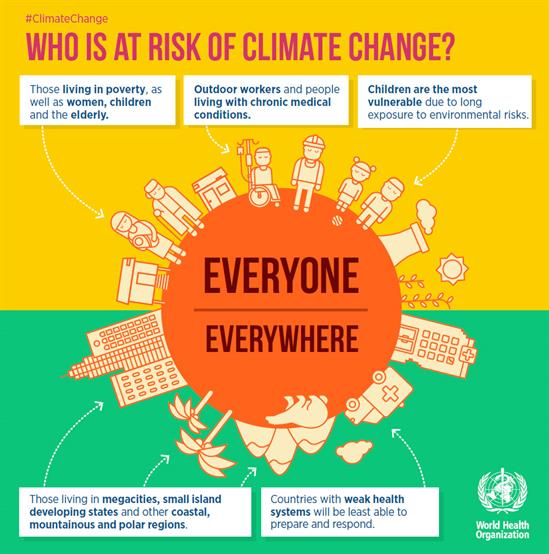Nutrition is a game-changing factor of sustainable development, whether it is at the local, national, or global level. In reality, it is the catalyst that decides the direction of progress.
Climate change is no fallacy. It is an occurrence that is mammoth in its dimension and here to stay. What is worth noting is that climate change, agriculture, and nutrition are intrinsically conjugated.
The effects of climate change across the food system have implications in nutrition outcomes. Endorsing this realization, a number of very prestigious Conferences and Symposiums have been held, World over.
To cite an example…. The Second International Conference on Nutrition (ICN2), jointly organized by FAO and WHO, was convened at FAO Headquarters in Rome, from 19-21 November 2014. Under the theme “Better Nutrition, Better Lives”, endorsed the Rome Declaration on Nutrition and the Framework for Action.
As an overview, Climate and nutrition affect the Society at large in many ways….Individual and family-oriented food security, fertility and population index, infant mortality, lactation, maternal health and wellness, general Wellness Index to name a few. I feel that the following factors emphatically influence the Climate-Nutrition Conjugate and ironically get influenced by it…..

Source: WHO
Environmental health and access to health services
GEOGRAPHICAL– The change of water to the land ratio in all parts of the world has adversely affected cultivable lands. This is being done under the guise of progress and gainful acquisitions of home and hearth, yet it is the most erroneous and myopic belief. Landmasses are also getting translocated and this too is very important in climate change.
ENVIRONMENTAL – Due to adverse changes in the quality of environment and onslaught of pollution, the changing dynamics of food, fodder, fed and the climate has resulted. The consequences are neither promising nor do they spell any boon for Mother Earth…..rather it is the death knell of the original purity of the planet.
The unforeseen and totally irreversible alteration of the environmental profile of the Mediterranean region…post-Chernobyl Disaster is a glaring example of how unforgiving the environment can be. There are notable effects on the water cycle, elemental cycles and even on nitrogen fixation
AGRICULTURAL– Since the crops cultivated are totally interdependent on the quality of ecosystems related to water, air and of course soil, the influence of climate and the adverse changes associated with it are extrapolated in the amount, type and biochemical quality of the crops cultivated. The secondary aspects include the individualistic projection of the species and interrelationship with other species also.
ECONOMIC AND SOCIOCULTURAL FACTORS– These include food culture, food export-import policies and even food tourism.
ANIMAL HUSBANDRY– Cattle play a very significant role in the influence on climate. Especially, cows that are bred for slaughterhouse purposes have been seen to be the primary source of greenhouse gases, carbon footprint reduction and even eutrophication and definitely global warming.
Nutrition and climate are scientifically interlinked. The effect of diet and dietary practices are directly traceable to the weather and the agrarian practices. The correct approach would be the concept of eat local, think global…. AND eat global, think local.
Nutritional diseases associated with deficiency diseases, malnutrition, avitaminosis, allergies and a general diminishing of the immune profile of the human organisms are not desirable but definitive outcomes of climate changes.
The possibility of mutation in response to an altered environment in all biological systems is a factor that cannot be ignored. Hence, ecosystem management….in microbial, plant and animal species namely the flora and fauna have to be addressed.
Organoleptic attributes and nutritional content of fruits depends on the soil ecosystem where it is cultivated…Ratnagirihapus compared to Devgadhhapus compared to Valsadhapus all are very diverse biochemically and nutritionally. (Hapus is the native name for Alphonso mango).
In the context of research and development in the plethora of agriculture, one of the premier objectives is to improve the quality of the agricultural strains in order to withstand the negative onslaught of Climatic transformations and still conserve the nutrient efficacy and bioavailability of nutritional factors.
One such innovation is highlighted in the development of provitamin A (proVA) enriched Zea Mays, which is resistant to aflatoxin contamination. Aflatoxins are secondary metabolites of fungi that impact food and feed across the food system.
This nodal example has been cited from the work of Suwarno et al., (2019), however, research endeavors in this area of science are in their nascent state and a lot more is to be studied, understood, imbibed and implemented if Climate and Nutrition have to be optimised as a Conjugate.
As far as aquaculture is concerned, there is a decline of fisheries due to climate change, a related cause for this decrease was due to over-fishing. Over-fishing exacerbates the effects of climate change by creating conditions that make a fishing population more sensitive to environmental changes.
Summing up, the climate of a particular geographic region is a reflection of its total exudation in terms of air, water and soil ecosystems over a period of time. Quality management of the individual and integrated environment would have an emphatic impact on the weather in a myopic dimension and in a sustainable manner.
The author acknowledges the use of authentic medical literature to structure this article.
Sign up for the QuackTrack.org newsletter below!















